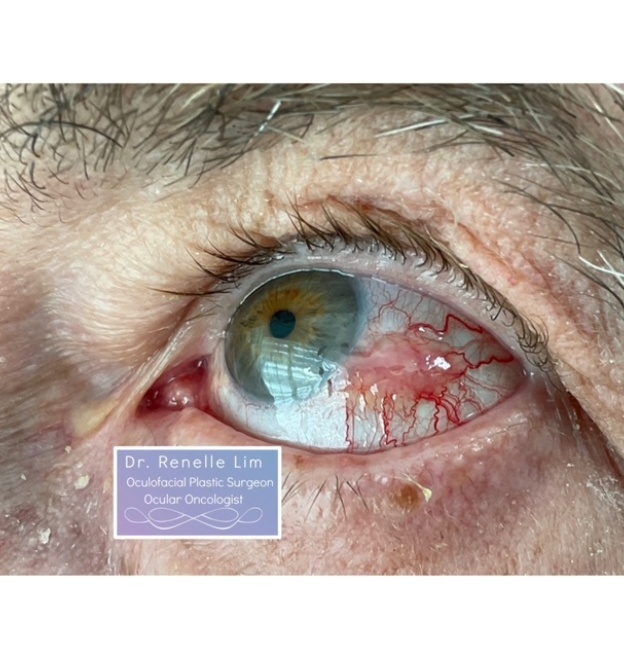Eyelid Tumors Treatment

What Types of Eyelid Tumors Are There?
There are several types of eyelid and conjunctival tumors that can occur, each with its own unique characteristics and treatment options. Some of the more common types include:
- Basal cell carcinoma (BCC): This is the most common type of eyelid cancer, accounting for approximately 90% of all cases. BCCs typically appear as a small, painless lump or ulcer on the eyelid and are often slow-growing. Surgical excision is the most common treatment for BCC, although other options, such as radiation therapy or topical chemotherapy, may also be considered.
- Squamous cell carcinoma (SCC): SCCs are less common than BCCs but tend to be more aggressive. They typically appear as a scaly, red, or pink patch on the eyelid that may bleed or ulcerate. Treatment options for SCC include surgical excision, radiation therapy, or topical chemotherapy.
- Sebaceous gland carcinoma (SGC): SGC is a rare but potentially aggressive form of eyelid cancer that arises from the sebaceous glands in the eyelid. It typically appears as a painless, yellowish nodule on the eyelid and can be easily mistaken for a benign lesion. Treatment for SGC often involves surgical excision, although other options, such as radiation therapy or systemic chemotherapy, may also be considered.
- Conjunctival tumors: Tumors that arise from the conjunctiva, the thin membrane that covers the white part of the eye, can also occur. These tumors may be benign (such as papillomas) or malignant (such as squamous cell carcinoma or melanoma). Treatment options for conjunctival tumors depend on the type and location of the tumor but may include surgical excision, cryotherapy, or topical chemotherapy.
How Are Eyelid and Conjunctival Tumors Treated?
In general, surgical excision is the most common treatment for eyelid and conjunctival tumors, although other options, such as radiation therapy or topical chemotherapy, may be considered in some instances. Non-surgical treatments such as cryotherapy (freezing the tumor with liquid nitrogen) or topical medications may also be used in some cases. It is essential to discuss all treatment options with a qualified ophthalmologist or oculoplastic surgeon, such as Dr. Renelle Lim, to determine the best course of action for each patient.
Why Choose Dr. Lim for Your Procedure?
Dr. Renelle Lim is a highly qualified and experienced ophthalmologist with specialized training in ocular oncology and oculoplastic surgery. Her credentials include:
- Double fellowship training in ocular oncology and oculoplastic surgery at the Wills Eye Hospital, one of the most prestigious and busiest ocular oncology programs in the United States.
- Board certification by the American Board of Ophthalmology, which requires rigorous training and examination in all areas of ophthalmology.
- Fellowship in the American College of Surgeons (FACS), which recognizes Dr. Lim’s commitment to the highest standards of surgical care and ethical conduct.
- Extensive experience in the diagnosis and treatment of a wide range of ocular tumors, including eyelid and conjunctival tumors.
- A commitment to providing personalized and compassionate care to each patient, with a focus on achieving the best possible outcomes through a multidisciplinary approach that may include surgery, radiation therapy, and other treatments.

